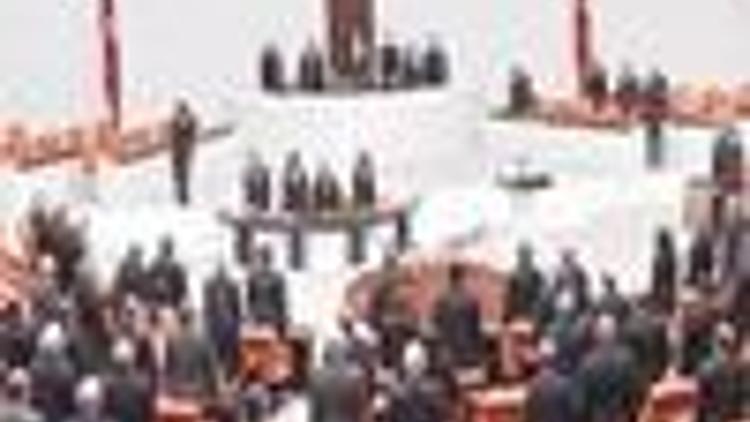Ergenekon dominates special Parliament meet
Güncelleme Tarihi:

ANKARA- Parliament’s special session to mark the occasion of National Sovereignty and Children’s Day is dominated by opposing views on the controversial Ergenekon investigation.Presedent Abdullah Gül and foreign heads of mission attend the extraordinary session while military officials and Chief of General Staff Gen. İlker Başbuğ are absent
The Ergenekon investigation left its mark on Parliament's special session yesterday, as political party leaders presented their own perceptions of public will about the ongoing trial, which divided the politicians largely between its pros and cons.
Prime Minister Recep Tayyip Erdoğan stood behind the Ergenekon case, an investigation into an alleged organization that is suspected of plotting to overthrow the government.
"Every clandestine organization targeting Parliament will be uprooted within the framework of law and democracy," Erdoğan said. "This Parliament will stand fast against any initiatives that undermines the national will and democracy, which hampers Turkey’s development, growth and prestige." The detentions and arrests of scores of intellectuals, jurists, civil society leaders and retired military officers known for their secular and anti-AKP stance led to arguments that the government is abusing the case to suppress the opposition. "Those avoiding responsibility to shed light upon the darkness will not be able to look in their children’s faces tomorrow," he said.
Independent judiciary
Main opposition Republican People's Party leader Deniz Baykal slammed the government regarding the Ergenekon case and emphasized the need for an independent judiciary. "The national will is not the only element of democracy," Baykal said. As Baykal started to criticize the Ergenekon case, a group of AKP deputies left the assembly in protest.
Baykal also criticized the 1960 and 1980 military coups in Turkey. "The fact that Parliament was suspended make these two events the most shameful events in history," Baykal said.
"Honest people and patriotic intellectuals of the country are detained by early morning police raids, without ever knowing what they are accused of," he said. "People are prosecuted on the basis of uttering from a rabbi, or on evidence negotiated at police stations or in the prosecutor’s office. "A cruel pressure campaign against opposition newspapers and TV stations runs amok. Real democracy arrives when the judiciary inspects politics, not the opposite," Baykal said.
Parliament Speaker Köksal Toptan said the current Constitution does not meet Turkey’s needs, Toptan said, adding that differences should be seen as richness. He reiterated that the definition of Turkishness is about encompassing everyone living in Turkey, not about ethnic separatism. "Everyone should know that cooperation between Turkey in the Caucasus, the Middle East and the Balkans would be sound and permanent," he said. Nationalist Movement Party leader Devlet Bahçeli argued against the rapprochement with Armenia, on the grounds that Turkey is being asked to keep old memories alive, "A vengeful attempt that goes under the name facing its past," he said. "We cannot accept these impositions."
Pro-Kurdish Democratic Society Party leader Ahmet Türk said a new Constitution that encourages participation would solve the Kurdish problem. He quoted Mustafa Kemal Atatürk’s words that signaled autonomy for Kurds. "That period’s spirit of democracy was much better than today’s," he said.

